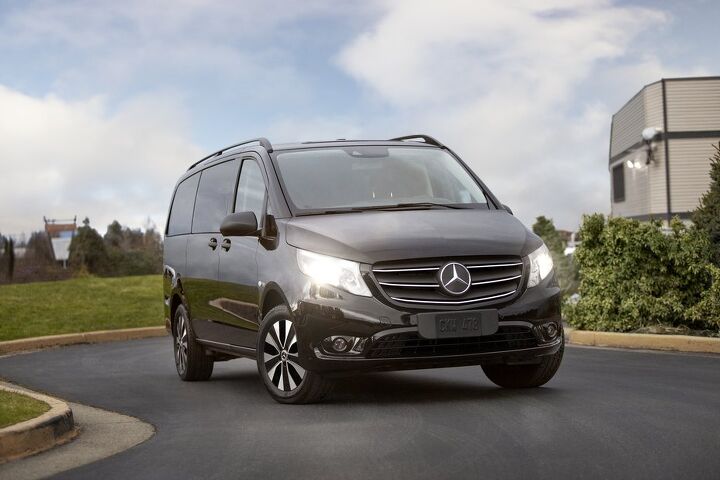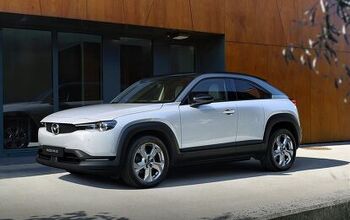Mercedes Pulling Metris Van From U.S. Market

Reports that Mercedes would be removing its Metris van from the U.S. market emerged over the weekend, with the German automaker confirming the decision.
Despite carrying a larger price tag than the competition (starting around $35,000), the Metris often compares favorably from behind the wheel when the maximum cargo capacity and price aren't the chief concerns. Unfortunately, those tend to be very important items when people are shopping for working vehicles and the Metris' sales numbers have reflected that. Mercedes has struggled to reach 10,000 deliveries annually and the Metris volume is routinely bested by models like the smaller Ford Transit Connect or the ancient, full-size Chevrolet Express.
Those aren't even the most popular alternatives, just a couple of random examples highlighting that the model's European sizing might not have played well in the United States. The Metris tends to be a little larger than the city vans preferred by small businesses and independent tradesmen — but dwarfed by full-sized vans focused entirely on capacity. The German commercial van's interior also lacks the same level of luxury expected from other products wearing the Mercedes badge. While it's a cut above some other working vehicles designed to ferry passengers, it's universally outclassed by the features found on the minivans occupying today the market (e.g. Chrysler Pacifica, Honda Odyssey, Toyota Sienna) which are also probably the closest to the Metris in overall size.
But it may be unfair to say Mercedes is pulling out wholly due to a lack of interest when Metris sales were improving ahead of the pandemic and on pace to break a record this year. In fact, the manufacturer would probably rather we ignore the glaring volume issue and focus on its decision to eliminate the turbocharged 2.0-liter inline-four that goes into the model. On Friday, Automotive News reported that it had intercepted a dealer memo stating that the motor would be discontinued, which likewise spells doom for certain versions of the larger Mercedes Sprinter van.
"As a result, the Mercedes-Benz Metris and gasoline Sprinter models will no longer be offered in the U.S. market after Q3 2023," the brand's U.S. vice president of commercial vehicles, Nicolette Lambrechts, said in the letter.
The Sprinter van's vastly more popular diesel option should stick around while the company prepares to electrify as many vehicles as is feasible. But something tells me the Metris would have been yanked from our market even if that wasn't the case. Considering the manufacturer has only sold around 60,000 units in America since 2015, there was likely no way MB Vans would have tried to press on. Mercedes is also starting to shift back upmarket, abandoning some of its lower-margin products that sticker for less.
[Images: Mercedes-Benz]
Become a TTAC insider. Get the latest news, features, TTAC takes, and everything else that gets to the truth about cars first by subscribing to our newsletter.

Consumer advocate tracking industry trends and regulations. Before joining TTAC, Matt spent a decade working for marketing and research firms based in NYC. Clients included several of the world’s largest automakers, global tire brands, and aftermarket part suppliers. Dissatisfied, he pivoted to writing about cars. Since then, he has become an ardent supporter of the right-to-repair movement, been interviewed about the automotive sector by national broadcasts, participated in a few amateur rallying events, and driven more rental cars than anyone ever should. Handy with a wrench, Matt grew up surrounded by Detroit auto workers and learned to drive by twelve. A contrarian, Matt claims to prefer understeer and motorcycles.
More by Matt Posky
Latest Car Reviews
Read moreLatest Product Reviews
Read moreRecent Comments
- Normie WHY must they put those Repeat Offender® wheels on everything, particularly on cars that were sublime to begin with? Fat tires = smoother ride.
- Jeff Definitely a blast from the past. I would have picked a Cutlass or Monte Carlo over this at the time.
- Cae The front end reminds me of how far we've come with aerodynamic design. This is clearly a pre-Oil Embargo styling effort. Today, the front ends of cars and SUV's are not as Baroque like this, but you don't lose 2 mpg because of all that bent metal, either (YMMV).
- Bd2 418 views, 10 days ago on Youtube. Seriously ?
- Redapple2 That is one ugly car.





































Comments
Join the conversation
I am sure somewhere, somebody is saddened by this.
I'm guessing this thing's gonna come back to the U.S. wearing a Freightliner badge.